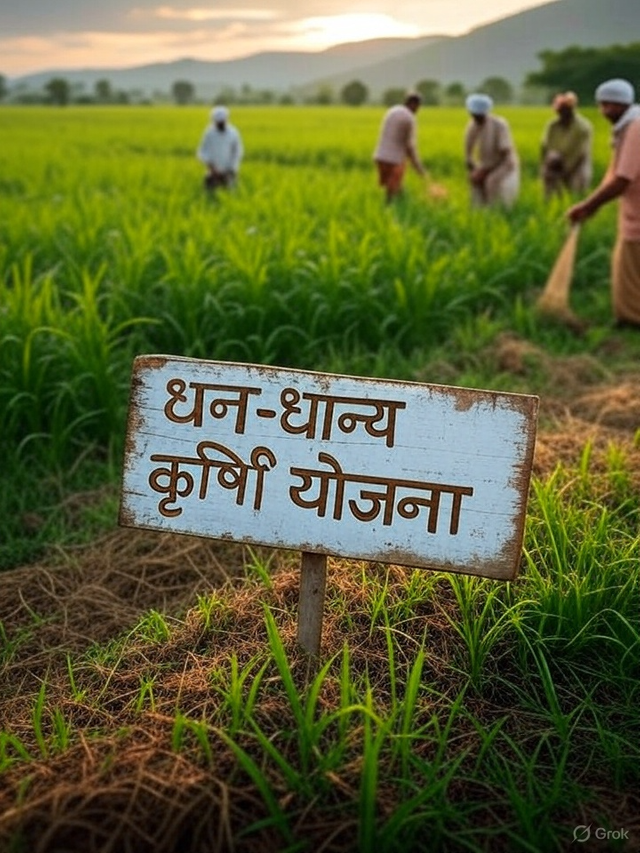Dhan-Dhanya Agricultural Scheme: Blessings for farmer-judges of ₹ 24,000 crore annually
Dhan-Dhanya Agricultural Scheme: Blessings for farmer-judges of ₹ 24,000 crore annually
India is an agricultural country where crores of farmers depend on their livelihood farming. The government runs several schemes to increase farmers' income, reduce production costs and strengthen the agricultural sector. One such ambitious scheme is "Dhan-Dhanya Krishi Yojana", for which the government has set a budget of ₹ 24,000 crore annually.
This article will tell you what is the money-funding agricultural scheme, what is its purpose, what facilities will be provided to the farmers in this, and how can this scheme change the Indian agricultural sector.
Purpose of the scheme
The main objective of the Dhan-Dhanya Krishi Yojana is to make modern techniques and resources accessible to double the income of Indian farmers and to bring stability in agricultural production.
It has some major objectives:
✅ To reduce the cost of production of farmers
✅ Providing high quality seeds and fertilizers
✅ Better irrigation system
✅ To simplify agricultural marketing (marketing)
✅ Strengthen infrastructure
✅ To promote conservation of natural resources
Why is a budget of ₹ 24,000 crore important annually?
The government has set a big budget of ₹ 24,000 crore every year for this scheme. This amount will be spent directly on the requirements of farmers and agricultural sectors.
This budget will be used mainly in these works:
🌾 Advanced seeds and fertilizer subsidies
Subsidy on modern agricultural equipment
💧 Micro-irrigation (drip irrigation) and drip system promoted
🏭 Agricultural storage facilities and warehouse construction
🛤 Connectivity for rural roads and markets
📈 Training and digital platforms for farmers
This will not only increase the income of farmers, but will also improve the productivity and quality of the agricultural sector.
How will farmers benefit?
Many such facilities will be provided in the Money-Funding Agricultural Scheme, which will be benefited directly by the farmers.
✅ Subsidy on seeds and fertilizers:
Farmers will get certified and high quality seeds at affordable rates. Subsidies on fertilizers will reduce production costs.
Agricultural equipment at cheap rates:
Modern equipment like tractor, power tiller, thresher, drone sprayer will be exempted, so that even small farmers can buy them.
✅ irrigation facility:
Irrigation projects will be promoted. There will be subsidy on drip and drip irrigation, which will save water and improve crop yield.
✅ Agricultural infrastructure:
Cold storage, warehouse and processing units will be built in villages so that farmers can protect their crops and sell them at good prices.
✅ access to the market:
Easy connectivity will be created for farmers up to Mandi. Digital platforms like E-NAM (E-NAM) will be promoted so that farmers can reach the market directly.
✅ Agricultural Training:
Farmers will be trained on modern technologies, organic farming, weather forecasting farming and crop management.
Who will get benefit?
✅ Small and marginal farmers
✅ medium and big farmers
✅ female farmer
✅ Kisan Manufacture Organization (FPO)
✅ Cooperatives
The aim of the government is to reach the farmers of all sections.
Impact of the plan - expectations and changes
The government hopes that this scheme can increase farmers' income by 50% by 2027.
✔ Production cost will be reduced
✔ Crop quality will increase
✔ Agricultural products will get better prices
✔ Rural economy will accelerate
✔ Employment opportunities will increase
✔ Migration in villages will be reduced
Dhan-Dhanya Krishi Yojana- There is an attempt to bring a new revolution in the Indian agriculture sector. An investment of ₹ 24,000 crore annually shows how serious the government is for the good of farmers.
If this scheme is implemented with transparency and honesty, it can bring a big change in the lives of crores of farmers of the country.
👉 Farmers brothers and sisters should share information about this scheme in their villages and take advantage of it if they are eligible.
